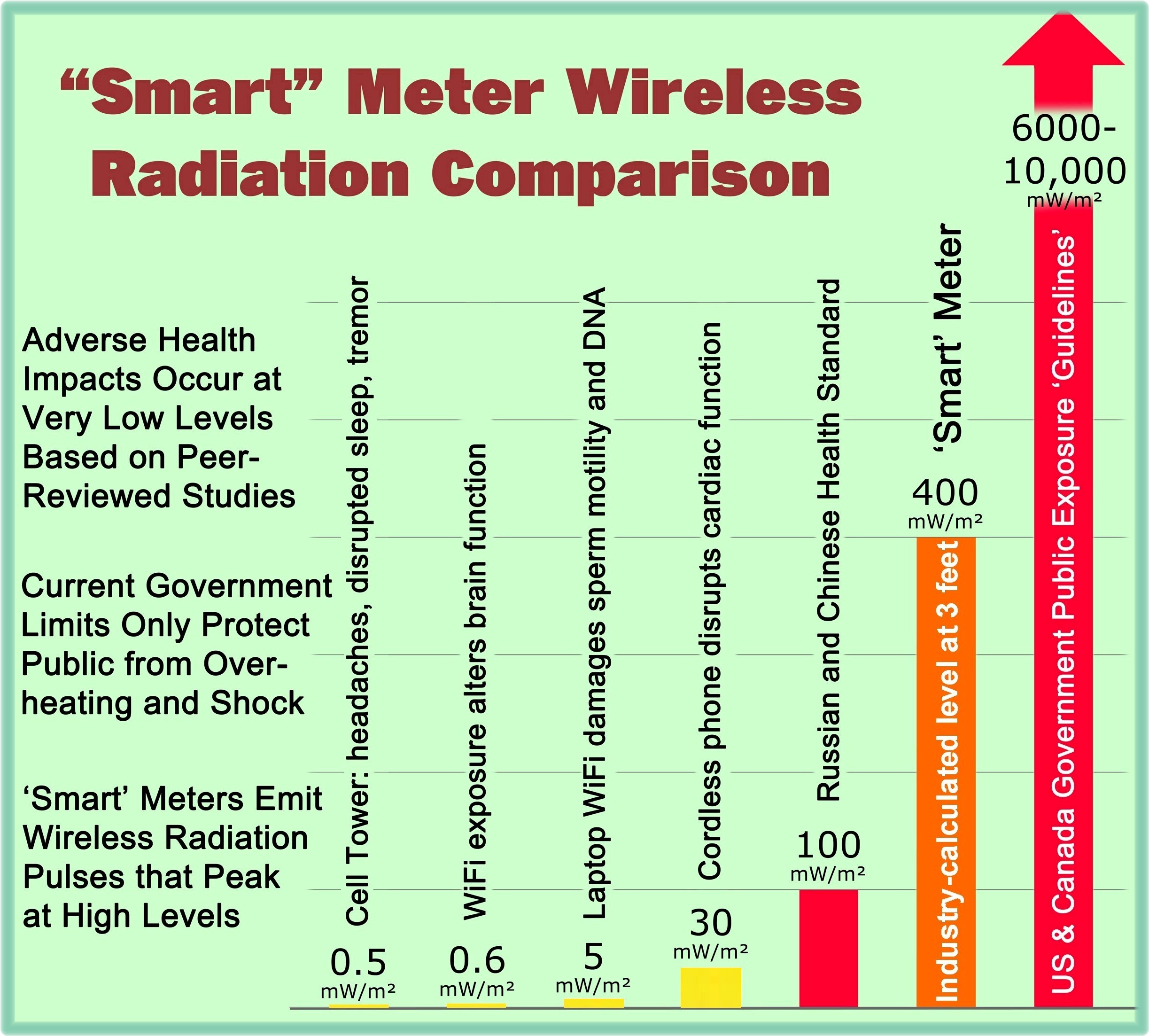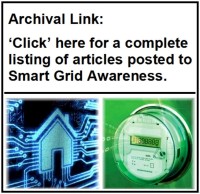by K.T. Weaver, SkyVision Solutions
 This article highlights the views of Stephen Thomas on the topic of smart meters. Stephen Thomas is an Emeritus Professor for energy policy at the University of Greenwich. Professor Thomas was featured as a guest on BBC Radio’s Money Box program on March 26, 2016 [1]. In addition, he has published a paper entitled, “Not Too Smart an Innovation: Britain’s Plans to Switch Consumers to Smart Electricity and Gas Meters” [2].
This article highlights the views of Stephen Thomas on the topic of smart meters. Stephen Thomas is an Emeritus Professor for energy policy at the University of Greenwich. Professor Thomas was featured as a guest on BBC Radio’s Money Box program on March 26, 2016 [1]. In addition, he has published a paper entitled, “Not Too Smart an Innovation: Britain’s Plans to Switch Consumers to Smart Electricity and Gas Meters” [2].
An audio excerpt of the BBC radio program is provided below.
BBC Radio’s Money Box Program (8-minute excerpt) [1]:
Some of the key points from the discussion with Stephen Thomas went as follows:
Costs, Benefits, and Behavioral Change
On Money Box with Lesley Curwen: “Let’s talk about the costs and the benefits. The government [of Great Britain] thinks that we could save as households on average about 26 pounds (£) per year from using smart meters [at a cost of 11 billion pounds].”
Stephen Thomas: “11 Billion works out at about 500 pounds per household, for 250 pounds per meter [one for gas and one for electricity]. So, if it is just 26 pounds per year, that’s not a very good rate of return.”
“The cost-benefit analysis does rely very much on behavioral change, so people looking at their meter, deciding that they’re using too much and turning things down. Which doesn’t really address what smart meters are for, which is to smooth out peaks in demand.”
“If I look at a smart meter in the middle of winter, the coldest day, 6 o’clock in the evening, and I see I’m using a lot of energy, do I turn my heating off and have a salad rather than my hot meal? I might do that in autumn when it’s not so cold, but that wouldn’t help out the electricity industry because that’s not going to smooth out a peak.”
“You have to be a little bit careful about these [behavioral trials]. You tell a consumer here’s a fantastic new piece of kit that will monitor your energy. Of course they are going to look at it. What we need to know is that ten years down the line, will people still be going to look at it when it is no longer a novelty. So I think we have to take those [projected] savings with a big pinch of salt.”
Billing Tariffs Advertised to Save Consumers Money
Lesley Curwen: “Not everybody saves money, do they? It’s about behavioral change.”
Rosie McGlynn: “So 61% of customers did save money as a result of that trial.”
Lesley Curwen: “But 39% would have actually lost it, they would have spent more than if they’d been on an ordinary tariff.”
Rosie McGlynn: “Because of the actions they took. So part of that trial was about asking customers to use their washing at different times, and those customers who didn’t save any money hadn’t acted on that.”
Stephen Thomas: “There is no intellectual case for smart meters unless you have time-of-day tariffs. And you have to be clear that time-of-day tariffs have to be unpredictable. And I think it’s worth saying at this point that that applies to electricity because electricity demand and supply have to match every second of every day. It doesn’t apply to gas. And I have yet to hear any convincing explanation as to why we need smart meters for gas because the pressure in the gas network will accommodate switches in demand and supply very happily.” … per Curwen: “Because you can store gas whereas as things stand you can’t really store electricity.”
Effects on Vulnerable Populations
Lesley Curwen: “Stephen Thomas, you are worried about how time-of-use tariffs might affect [poorer and more vulnerable customers].”
Stephen Thomas: “Yes, by definition, the smart meters are to smooth out peaks, and the most expensive peak is on the coldest day in winter at about 6 o’clock. If you are going to have time-of-use tariffs, that’s when it’s going to be most expensive. So you are thinking about a vulnerable household or a pensioner looking at their meter, seeing a very high price, and being scared to death of not being able to pay that bill and switching things off to the damage of their welfare.”
“If you don’t have time-of-day pricing, I can see absolutely no reason why once you’ve learned what you’re actually using your energy for, why you would bother to look at it again if there is no incentive to switch something off now and use it later. So I don’t know what they are for if they’re not for that.”
Selected Excerpts from the Published Article by Stephen Thomas [2]
“Time-of-day pricing has always been the main rationale for smart meters, and is particularly favoured by free market economists, who place great emphasis on consumers being fully exposed to the costs that they actually incur.”
“Telling consumers about the energy used by such machines [as washing machines, dishwashers, tumble dryers, and refrigerators/freezers] does not require them to install and run smart meters; simple education would be much more cost-effective.”
“For gas, consumption is dominated by space and water heating, usually in a single boiler, with some demand for cooking. Consumers are therefore already largely aware where their gas is being used, making the information from a smart meter mostly redundant.”
“Physically reading a meter is a relatively expensive process, so it seems plausible that replacing manual readings with electronic readings would save money. In practice, though, most consumers are able to read their meters, and go on either to telephone or submit online their direct reading to the company. For a small number of consumers, reading their own meters may not be feasible; but special arrangements can be made for such households, so the problem of inaccurate estimated readings does not seem so difficult to solve.”
“Inevitably, there will be winners and losers from the introduction of time-of-day pricing. The balance of costs against benefits will identify whether the amount won by winners will be enough to counterbalance the losses made by losers. However, a positive net benefit doesn’t, by itself, justify the introduction of smart meters. The winners need to be consumers, much more than energy companies; and the losers must not be vulnerable and low-income consumers.”
“However, in a competitive market, consumers will have no confidence that any benefits will come to them, rather than being captured by the companies as extra profits. If time-of-day pricing is introduced, neutral information will not, as the government claims, be the mechanism through which consumers can make informed and beneficial decisions. A crude and heavy-handed price mechanism will be what changes behaviour, with poorer consumers being forced not to consume because they cannot afford the bills.”
“Perhaps the strangest aspect of smart meters is how a technology that is so little understood can create such a wealth of goodwill and such commercial momentum. Part of the answer is public credulity toward anything labelled ‘smart’; a credulity that perhaps extends to policy makers and government officials. There is an urgent need for the technology to be demystified, so that it can be properly judged on rational grounds. Governments and regulators are particularly culpable in providing fact sheets and press releases that, at best, are disingenuous – by not making clear the purpose of the technology – and that, at worst, are positively misleading.”
Summary
This article summarizes the views of Professor Stephen Thomas and asserts that smart meters are probably not cost-effective or useful for the purposes that are normally advertised by those promoting them, i.e., providing more detailed energy usage information to consumers and automatic collection of meter data. Simple education of consumers and customers being able to submit their own readings would be much more cost-effective.
Stephen Thomas views time varying rates as the only reason that smart meters can be justified in order to force changes in the demand profile and to fully expose consumers to the costs associated with generating electricity. Time varying rates, however, will create “winners and losers,” and the biggest losers will most likely be vulnerable and low-income consumers. In addition, it would seem there is no viable economic or policy justification for deploying smart meters for gas.
The deployment of smart meters does not appear to be based upon “rational grounds” but more based upon labeling the technology as “smart” in order to deceive both the regulators and the public.
Source Material for this Article
[1] “Smart Energy Meters in the UK,” BBC Radio 4, Money Box, March 26, 2016; available at http://www.bbc.co.uk/programmes/b07414rp
Description of Program:
On Money Box with Lesley Curwen: new improved energy smart meters will be rolled out later this year. We’ll see our energy use and its exact cost – doing away with the need for estimated bills. But just who benefits from the £11bn project? The costs will be borne by consumers who in return get projected savings of £26 a year off their energy bills. It’s expected there will be new tariffs as well – called Time of Use tariffs. We are likely to be paying far more for our energy during peak periods in the early evening. Meanwhile energy will be cheaper overnight and during the morning. Will customers be flexible enough to radically change when they use gas and electricity to save money? Lesley Curwen and a panel of experts discuss the issues. Smart meters – smart or dumb?
Joining Lesley Curwen are: Sacha Deshmukh, Chief Executive of Smart Energy GB; Stephen Thomas, Emeritus Professor of Energy Policy at the University of Greenwich; and Rosie McGlynn, director of new energy service from Energy UK.
[2] “Not Too Smart an Innovation: Britain’s Plans to Switch Consumers to Smart Electricity and Gas Meters,” by Stephen Thomas, Energy & Environment, Volume 23, Issue 6-7 (2012), pp. 1057–1074; available at http://multi-science.atypon.com/doi/abs/10.1260/0958-305X.23.6-7.1057
Steve Thomas is Professor of Energy Policy and Director of Research at the University of Greenwich, where he has been employed for the past decade. Prior to that, he was with the Science Policy Research Unit at the University of Sussex for more than 20 years. He has been an independent energy policy researcher for more than 35 years, and has written extensively on the economics of nuclear power, the liberalisation of energy markets, the policies of the major energy corporations, and fuel poverty.
Additional Background Article
“Will smart meters be worth the money?,” BBC News, March 26, 2016, at http://www.bbc.com/news/business-35894922





Pingback: Little Justification for ‘Smart’ Meters Unless to Serve as a “Crude and Heavy-Handed Price Mechanism” to Change Behavior | Smart Grid Awareness | Sacramento Smart Meter Awareness